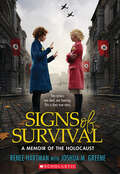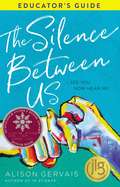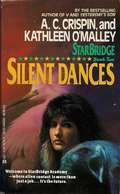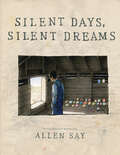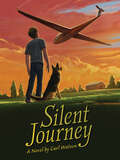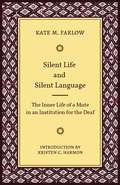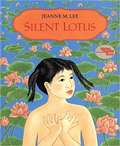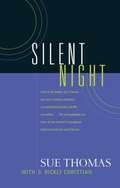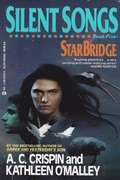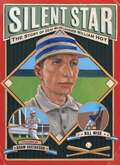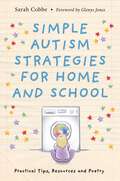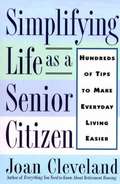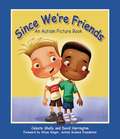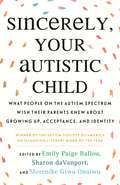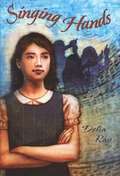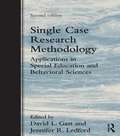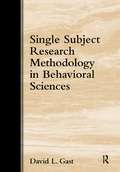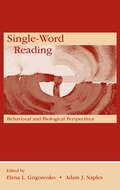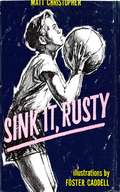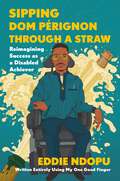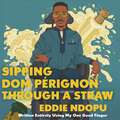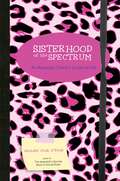- Table View
- List View
Signs of Survival: A Memoir of the Holocaust
by Joshua M. Greene Renee HartmanRENEE: I was ten years old then, and my sister was eight. The responsibility was on me to warn everyone when the soldiers were coming because my sister and both my parents were deaf.I was my family's ears.Meet Renee and Herta, two sisters who faced the unimaginable -- together. This is their true story.As Jews living in 1940s Czechoslovakia, Renee, Herta, and their parents were in immediate danger when the Holocaust came to their door. As the only hearing person in her family, Renee had to alert her parents and sister whenever the sound of Nazi boots approached their home so they could hide.But soon their parents were tragically taken away, and the two sisters went on the run, desperate to find a safe place to hide. Eventually they, too, would be captured and taken to the concentration camp Bergen-Belsen. Communicating in sign language and relying on each other for strength in the midst of illness, death, and starvation, Renee and Herta would have to fight to survive the darkest of times.This gripping memoir, told in a vivid "oral history" format, is a testament to the power of sisterhood and love, and now more than ever a reminder of how important it is to honor the past, and keep telling our own stories.
Silence Between Us Educator's Guide
by Alison GervaisThe Silence Between Us Educator's Guide is a companion to The Silence Between Us by Alison Gervais. This guide can be utilized in the classroom, in a home school setting, or by parents seeking additional resources. Ideal for grades 7-12.
Silencing the Voices: One Woman's Triumph Over Multiple Personality Disorder
by Jean Darby ClineJEAN is a dutiful wife who will do anything to make her marriage work. But JODY hates Jean's husband and is determined to drive them apart. Little JD just hides from it all, emerging only when Jean's painful past is more than she can bear. These are the voices that live within the mind of Jean Darby Cline. As a child, Jean suffered unspeakable mental and sexual abuse at the hands of her father. As an adult, her first husband's verbal abuse and cruel outbursts of rage echoed the violence of her childhood. Jean hoped that psychotherapy would help ease her depression-and fill in the major lapses of her memory. Instead, Jean made a startling discovery. The childhood horrors she'd endured had caused her personality to fragment into three separate entities-three people with opinions and emotions all their own...
Silent Dances (Starbridge #2)
by A. C. Crispin Kathleen O'MalleyDeaf since birth, Tesa is the perfect ambassador to the alien Grus, whose sonic cries can shatter human ears. But her mission is harder than it looks. The Grus are not alone on their world. They have deadly enemies, both natural and otherwise. And if Tesa is to save all life on the planet, she will have to make peace with not one alien species but two.
Silent Days, Silent Dreams
by Allen SayCaldecott Medal winner Allen Say brings his lavish illustrations and hybrid narrative and artistic styles to the story of artist James Castle.James Castle was born two months premature on September 25, 1899, on a farm in Garden Valley, Idaho. He was deaf, mute, autistic, and probably dyslexic. He didn't walk until he was four; he would never learn to speak, write, read, or use sign language.Yet, today Castle's artwork hangs in major museums throughout the world. The Philadelphia Museum of Art opened "James Castle: A Retrospective" in 2008. The 2013 Venice Biennale included eleven works by Castle in the feature exhibition "The Encyclopedic Palace." And his reputation continues to grow.Caldecott Medal winner Allen Say, author of the acclaimed memoir Drawing from Memory, takes readers through an imagined look at Castle's childhood, allows them to experience his emergence as an artist despite the overwhelming difficulties he faced, and ultimately reveals the triumphs that he would go on toachieve.
Silent Journey
by Carl WatsonScott Schroeder dreams of a day when he and his father can have a home of their own. Following an accident that took his mother's life eight years before, doctors discovered Scott was suddenly deaf. Blessed with being an accomplished gymnast and skilled at signing and reading lips, Scott's biggest challenge is convincing others he is able to do all the same things as those in the hearing world. Picking up on conversations he observes along the way, Scott figures out a big family secret concerning his father and uncle and makes his mind up to play a part in their reconciliation.
Silent Life and Silent Language: The Inner Life of a Mute in an Institution for the Deaf (Gallaudet Classics Deaf Studie #11)
by Kristen C. Harmon Kate M. FarlowSilent Life and Silent Language presents a fictionalized account of life at a Midwestern residential school for deaf students in the years following the Civil War. Based on the experiences of the author, who became deaf at the age of nine and entered a residential school when she was twelve, this historical work is remarkable and rare because it focuses on signing deaf women’s lives. One of only a few accounts written by deaf women in the 19th century, Silent Life and Silent Language gives a detailed description of daily life and learning at the Indiana Asylum for the Education of the Deaf and Dumb. Kate M. Farlow wrote this book with the goal of giving hearing parents hope that their deaf children would be able to lead happy and productive lives. She sought to raise awareness of the benefits of deaf schools and was an early advocate for the use of American Sign Language and of bilingual education. The Christian influence on the school and on the author is strongly present in her writing and reflects an important component of deaf education at the time. Descriptions of specific signs, games, ASL story nights, and other aspects of the signing community during the 1870s will be of interest to modern students and researchers in linguistics, deaf education, Deaf studies, and Deaf history. Farlow’s work reveals a sophisticated, early understanding of the importance of access to language, education, and community for deaf individuals.
Silent Night
by Sue Thomas<P>Some people may have considered Sue Thomas's deafness a liability. The FBI considered it an asset.... <P>Growing up in northeastern Ohio, Sue Thomas was like any other toddler. But one evening while watching television with her family, suddenly she couldn't hear the sound of the program. The next morning Sue didn't respond to anyone's voice. Her parents rushed her to their family doctor. He delivered devastating news: eighteen month-old Sue had experienced a sudden and total hearing loss. <P>Sue's parents made a lifelong commitment to help her live as normal a life as possible in the hearing world. With professional assistance, Sue learned to speak and lip read. When school presented challenges, Sue worked harder, eventually earning a B. S. degree and completing graduate work in political science and international relations. <P>A door opened at the FBI for Sue to begin a training program for deaf people to classify fingerprints. But when agents realized Sue's uncanny ability to read lips, they approached her about undercover surveillance. Sue excelled at her job, exceeding her family's expectations. <P>Yet something still seemed to be missing in her life. Refocusing her goals on helping others, today Sue is a motivational speaker with a deeper purpose who appears regularly before civic, professional, and church groups. Silent Night tells her inspiring story.
Silent Songs (Starbridge #5)
by A. C. Crispin Kathleen O'MalleyThe men and women of StarBridge found intelligent life -- and new friends -- across the galaxy... In the skies of Trinity, the birdlike Grus welcomed the deaf human ambassador, Tesa. In the seas of Trinity, the aquatic Singers communicated with the young telepath, Jib. But on the surface of Trinity, a different kind of life form has landed. They are amphibious beings from a distant world. And they are definitely -not- friendly...
Silent Star: The Story of Deaf Major Leaguer William Hoy
by William WiseThe biography of William Ellsworth Hoy, the first deaf player to have a successful career in professional and Major League baseball.William Hoy loved baseball. Growing up in the 1860s and '70s, he dreamed of one day playing in the major leagues. A far-off fantasy for many boys, fulfilling this dream was even more of a long shot for William, who was deaf. Striving to find his place in a hearing world, Hoy became a shoemaker. He took pride in his work, but baseball was still his real love. When an amateur team coach saw him playing behind the shoemaker's shop, Hoy dazzled the coach with his hard-hitting skills. Moving from amateur clubs to the minor leagues and eventually to the majors, Hoy proved himself again and again-overcoming obstacles and becoming a star both on and off the baseball diamond. Silent Star: The Story of Deaf Major Leaguer William Hoy is a tribute to one of the most inspirational figures in baseball history. A talented player with a standout record, Hoy is a shining example that success in life should not be measured by differences but by drive and determination.
Simple Autism Strategies for Home and School: Practical Tips, Resources and Poetry
by Sarah CobbeOffering a unique overview of a child's point of view of life with autism, this guidebook will help parents and teachers better understand how this condition is experienced in day to day life. Organised by topic for easy reference, it explores the issues that can arise in everyday situations from toilet training to homework.Learning points, situation-specific activities, and further resources offer practical guidance, while discussion tools such as original poetry illustrate the perspectives of children with autism. Concise and accessible, this book takes a creative approach to understanding autism, and will be an invaluable reference book.
Simple Signs
by Cindy WheelerWant to learn a few American Sign Language words? Other books about sign language are available in this library.
Simplifying Life as a Senior Citizen: Hundreds of Tips to Make Everyday Living Easier
by Joan ClevelandProviding solutions for common problems that afflict the daily lives of the elderly, this book presents information to help readers save time, money, frustration, and pain. Includes chapters of tips for managing vision loss, hearing loss and loss of mobility. The book provides chapters of easily read one-line tips that address a variety of broad as well as specific situations.
Since We're Friends: An Autism Picture Book
by David Harrington Celeste Shally Alison SingerMatt's autism doesn't stop him from having fun! Even when Matt struggles to navigate social situations, his friend is there to help him out. The two boys enjoy playing sports, watching movies, reading books, and talking about animals. Working together, a best friend's compassion and understanding turn Matt's frustration into excitement. Whether on the basketball court, the playground swings, or at the neighborhood pool, the two friends enjoy each other's company. David Harrington's colorful illustrations complement Celeste Shally's touching story of friendship to create a book that is the perfect guide for children and parents to better understand those with autism spectrum disorders.
Sincerely, Your Autistic Child: What People on the Autism Spectrum Wish Their Parents Knew About Growing Up, Acceptance, and Identity
by Autistic Women and Nonbinary NetworkA rare and diverse collection of autistic voices that highlights to parents the unique needs of girls and nonbinary people who are growing up with autism.Most resources available for parents come out of the medical model of disability--from psychologists, educators, parents, and doctors--offering parents a narrow and technical approach to autism. Furthermore, it is widely believed that many autistic girls and women are underdiagnosed, which has further limited the information available regarding the unique needs of girls and nonbinary people with autism. <p><p>Sincerely, Your Autistic Child represents an authentic resource for parents written by people who understand this experience most, autistic people themselves. From childhood and education to gender identity and sexuality, this anthology of autistic contributors tackles the everyday challenges of growing up while honestly addressing the emotional needs, sensitivity, and vibrancy of autistic girls and nonbinary people. Written like letters to parents, the contributors reflect on what they have learned while growing up with autism and how parents can avoid common mistakes and overcome challenges while raising their child. <p><p>Sincerely, Your Autistic Child calls parents to action by raising awareness and redefining "normal" in order to help parents make their child feel truly accepted, valued, and celebrated for who they are.
Singing Hands
by Delia Ray<P>As one of three hearing daughters of deaf parents, 12-year-old Gussie Davis is expected to be a proper representative of Saint Jude's Church for the Deaf in Birmingham, Alabama, which is run by her father. So when Gussie starts to hum through signed services in the summer of 1948, Reverend Davis assumes she merely wants to sing out loud and sends her to a regular church downtown. But Gussie's behavior worsens, and she is not allowed to go on a much-anticipated trip; instead, she must help her father at the Alabama School for the Deaf. <P>Rebelling against the strict rules of the school, Gussie finally confronts the difficulties and prejudices encountered by the deaf community, all while still trying to find her own identity in the worlds of both the hearing and the deaf. <P>Drawing on firsthand accounts of her mother's own childhood with deaf parents, Delia Ray provides an inside look at the South in the 1940s. Lively humor, unforgettable characters, and meticulous research combine to make this a standout novel that offers keen insight into what it means to be hearing in a deaf world.
Single Case Research Methodology
by Jennifer R. Ledford David L. GastIn this anticipated new edition of Single Case Research Methodology, David L. Gast and Jennifer R. Ledford detail why and how to apply standard principles of single case research methodology to one's own research or professional project. Using numerous and varied examples, they demonstrate how single case research can be used for research in behavioral and school psychology, special education, speech and communication sciences, language and literacy, occupational therapy, and social work. This thoroughly updated new edition features two entirely new chapters on measurement systems and controversial issues in single subject research, in addition to sample data sheets, graphic displays, and detailed guidelines for conducting visual analysis of graphic data. This book will be an important resource to student researchers, practitioners, and university faculty who are interested in answering applied research questions and objectively evaluating educational and clinical practices.
Single Subject Research Methodology in Behavioral Sciences
by Jennifer R. Ledford David L. GastThis book is written for student researchers, practitioners, and university faculty who are interested in answering applied research questions and objectively evaluating educational and clinical practices. The basic tenet of single-subject research methodology is that the individual is of primary importance and that each individual study participant serves as his or her own control. It is because of this focus on the individual that clinicians and educators have been using single-subject research designs for over 40 years to answer applied research questions. Although the methodology has its roots in behavioral psychology and applied behavioral analysis, it has been used by applied researchers across a variety of disciplines such as special education, speech and communication sciences, language and literacy, therapeutic recreation, occupational therapy, and social work. Key features include the following: Applied Focus – More than any other text, this one focuses on the nuts and bolts of how to use single-subject research in constructing one’s research project or in evaluating one’s professional practice. Numerous and Varied Examples – The book abounds in examples from special education and other disciplines and populations within the applied research literature. Reader Friendly – The text is written in a reader friendly style, features sample data sheets and graphic displays, and includes detailed guidelines for conducting visual analysis of graphic data. Expertise – The author’s long and distinguished career in teaching single-subject research is augmented in this book by contributions from other experts in the field.
Single-Word Reading: Behavioral and Biological Perspectives (New Directions In Communication Disorders Research Ser.)
by Elena L. Grigorenko Adam J. NaplesAs the first title in the new series, New Directions in Communication Disorders Research: Integrative Approaches, this volume discusses a unique phenomenon in cognitive science, single-word reading, which is an essential element in successful reading competence. Single-word reading is an interdisciplinary area of research that incorporates phonolog
Sink It, Rusty
by Matt ChristopherAfter recovering from Polio, a disease that left his legs weak, Rusty is worried that he won't be able to play basketball. Then Alect comes to town and starts a local basketball team. Will Rusty be able to help Alec's team win their games?
Sipping Dom Pérignon Through A Straw (Father Anselm Novels #13)
by Eddie Ndopu'Uncompromising... A masterful writer poised for even more great success' - Forest Whitaker, Academy award-winning actorA memoir, penned with one good finger, about being profoundly disabled and profoundly successful.Global humanitarian Eddie Ndopu was born with spinal muscular atrophy, a rare degenerative motor neuron disease affecting his mobility. He was told that he wouldn't live beyond age five and yet, Ndopu thrived. He grew up loving pop music and haute couture, lip syncing to the latest hits, and was the only wheelchair user at his school, where he flourished academically. By his late teens, he had become a sought-after speaker, travelling the world to give talks on disability justice. When he is later accepted on a full scholarship into Oxford University, he soon learns that it's not just the medical community he must defy - it's the educational one too. In Sipping Dom Pérignon Through a Straw, we follow Ndopu, sporting his oversized, bejewelled sunglasses, as he scales the mountain of success, only to find exclusion, discrimination, and neglect waiting for him on the other side. As he soars professionally, sipping champagne with world leaders, he continues to feel the loneliness and pressure of being the only one in the room. Determined to carve out his place in the world, he must challenge bias at the highest echelons of power and prestige. Searing, vulnerable and inspiring, Ndopu's remarkable journey to reach beyond ableism, reminds us never to let anyone else define our limits.'Unflinching honesty and vulnerability... Prepare to be moved, enlightened, and profoundly touched' Sabrina Dhowre Elba, actress, model and UN Goodwill Ambassador
Sipping Dom Pérignon Through A Straw (Father Anselm Novels #13)
by Eddie NdopuAn inspirational and truly intersectional memoir from global humanitarian and social justice advocate Eddie Ndopu-a queer, Black wheelchair user and one of the UN Secretary-General's 17 Advocates for the SDGs.There are many more examples throughout my life where, if I had listened to people who told me to be comfortable with merely existing, I would now be a shrunken version of myself. I would not have emerged as one of Amnesty International's most influential campaigners straight out of college. I would not have gone on to graduate from Oxford. I would not have been appointed as a United Nations SDG Advocate. I would be eating mashed-up vegetables instead of drinking Dom Pérignon through a straw.Eddie Ndopu was born in 1990 with Spinal Muscular Atrophy (SMA), a rare degenerative motor-neuron disease, and told that he wouldn't live beyond age five. Now, thirty-one years old and stronger than ever, he continues to celebrate each turn around the sun as an existential defiance of the odds.Having fought his way through South Africa's archaic and ableist school system, Eddie became the first-ever disabled African to be given a full scholarship to Oxford University. Gay, Black and a wheelchair user, he is now an eminent thought-leader and holds positions at two of the most important organizations on the planet: the United Nations and the World Economic Forum.From flirting with diplomats on dancefloors to wearing lipstick to board meetings, Eddie has spent his life challenging the bias of those who occupy the highest echelons of power and prestige. Through redefining the boundaries of identity and ability, Sipping Dom Pérignon Through a Straw is Eddie's odds-obliterating story that illustrates what true leadership can look like and reminds us to never forget that you are bigger and more expansive than the space you currently occupy.(P) 2023 Hachette Audio
Siren's Dance: My Marriage to a Borderline
by Anthony WalkerThe author mixes his personal experience with medical information about borderline personality disorder
Sisterhood of the Spectrum: An Asperger Chick's Guide to Life
by Jennifer Cook O'Toole Anne-Louise RichardsSpectrum gals, ever wished you had a handbook to help navigate the confusing world of teenage girlhood? Look no further! Aspie-in-the-know, Jennifer Cook O'Toole provides just that with her inspirational guide to life for teenage girls with Asperger syndrome. Drawing on her own, real-life experiences rather than preaching from textbooks, she covers everything you need (and want!) to know, from body shapes and love interests to bullying, friendships and how to discover and celebrate your unique, beautiful self. With illustrations by an Aspie teen and inspirational quotes from well-known, female Aspie voices, including Temple Grandin, Rudy Simone, Robyn Steward, and Haley Moss, Sisterhood of the Spectrum is your perfect companion on the "yellow brick road" to womanhood. It will leave you empowered, informed and excited to be different.
